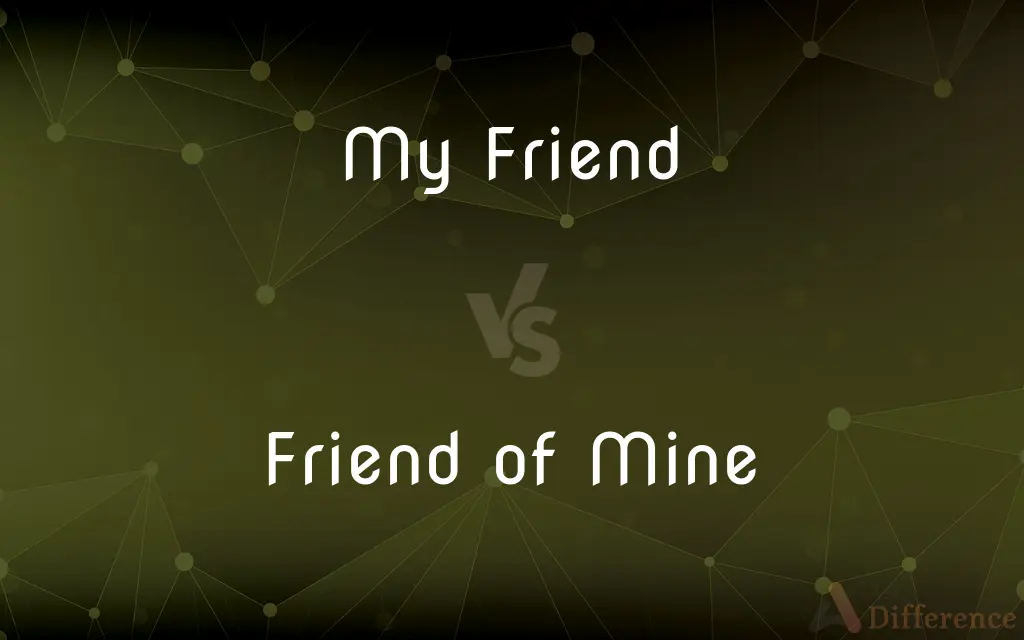My Friend vs. Friend of Mine — What's the Difference?
By Tayyaba Rehman — Published on November 25, 2023
"My Friend" and "Friend of Mine" are phrases that both refer to a person with whom one has a bond of mutual affection. "My Friend" is more direct, while "Friend of Mine" is somewhat more informal and can emphasize a shared friendship with the listener.

Difference Between My Friend and Friend of Mine
Table of Contents
ADVERTISEMENT
Key Differences
"My Friend" is a common phrase used directly to denote a person whom you consider a friend. The use of "My" implies a personal connection or possession, representing a straightforward relationship. Conversely, "Friend of Mine" presents a slightly indirect and potentially more casual or colloquial way to express the same relationship, yet can imply a certain collective or shared understanding of the friendship.
Utilizing "My Friend" in dialogue or writing commonly provides a clear, unequivocal indication of friendship. The listener understands directly the relationship between the speaker and the other individual. "Friend of Mine" might be chosen in conversation to imply a shared acquaintance or a shared circle of friends, possibly providing a slight nuance of camaraderie with the listener.
"My Friend" can denote exclusivity, especially in contexts where the friendship is being emphasized or defined. When one says "My Friend," it’s clear and concise, establishing an immediate connection. In contrast, "Friend of Mine" may be used to illustrate or emphasize friendships within a mutual or larger group, providing a sense of an inclusive friendship network.
Exploring "My Friend," this formulation is regularly employed in both formal and informal contexts, fitting seamlessly into various communication scenarios. On the flip side, "Friend of Mine" might be perceived as slightly more laid back or informal, possibly emerging more frequently in relaxed, social conversational settings.
When distinguishing between people within a group, “My Friend” is often used to single out a specific individual, firmly establishing a direct friendship. On the contrary, “Friend of Mine” could be used when talking within a group where multiple people know the individual being discussed, suggesting a communal friendship.
ADVERTISEMENT
Comparison Chart
Formality Level
Can be used in formal contexts
Slightly more informal
Implication
Direct relationship
Possibly implying a shared acquaintance
Usage in Discussion
Directly refers to a friend
May suggest a friend known to a group
Possessiveness
Direct possession (“My”)
Indirect possession (“of Mine”)
Emphasis
On the individual friendship
On the collective or mutual friendship
Compare with Definitions
My Friend
May denote a single, specific friend.
My friend gave me this book.
Friend of Mine
An indirect reference to a friend.
A friend of mine works there.
My Friend
Often used in introductions.
This is my friend, Jane.
Friend of Mine
Less direct than “my friend.”
A friend of mine gave me this advice.
My Friend
Signifying a personal connection.
My friend is really good at basketball.
Friend of Mine
Emphasizing shared connections.
A friend of mine knows you well.
My Friend
A person with a direct bond.
My friend visited me yesterday.
Friend of Mine
May highlight a friend within a group.
That's a friend of mine from school.
My Friend
A straightforward friendship claim.
My friend just graduated from university.
Friend of Mine
Possibly implying mutual friendships.
A friend of mine also loves hiking.
Common Curiosities
Is one phrase more possessive than the other?
“My Friend” might be perceived as more directly possessive.
Does “Friend of Mine” suggest mutual friendships?
Yes, it can imply a friendship known within a mutual group.
Is “My Friend” used in official or formal writing?
Yes, it can be used formally and informally.
Is it grammatically correct to say “My Friend”?
Yes, “My Friend” is grammatically correct.
Can “My Friend” and “Friend of Mine” be used interchangeably?
Often yes, but subtle contextual differences might make one more suitable than the other.
Which phrase is likely to appear in casual conversations?
“Friend of Mine” might appear more in casual, colloquial speech.
Is “My Friend” more formal than “Friend of Mine”?
“My Friend” can be used in both formal and informal contexts, while “Friend of Mine” can be slightly more informal.
Which phrase emphasizes a direct relationship?
“My Friend” directly indicates a relationship.
Can I use “Friend of Mine” when introducing someone?
Yes, but it’s less common in introductions than “My Friend.”
Is “My Friend” suitable in professional environments?
Yes, it can be used professionally and socially.
Can “Friend of Mine” imply a degree of separation?
It can suggest a slight indirectness compared to “My Friend.”
Is “My Friend” concise and clear?
Yes, “My Friend” provides a clear, direct reference to a friend.
Is it polite to say “My Friend”?
Yes, it’s polite and commonly used.
Is “Friend of Mine” more relational?
It may suggest a friendship within a shared or mutual context.
Can I use “Friend of Mine” to refer to any friend?
Generally yes, though context may make one phrase more suitable.
Share Your Discovery

Previous Comparison
Head Chef vs. Executive Chef
Next Comparison
IP Camera vs. CCTVAuthor Spotlight
Written by
Tayyaba RehmanTayyaba Rehman is a distinguished writer, currently serving as a primary contributor to askdifference.com. As a researcher in semantics and etymology, Tayyaba's passion for the complexity of languages and their distinctions has found a perfect home on the platform. Tayyaba delves into the intricacies of language, distinguishing between commonly confused words and phrases, thereby providing clarity for readers worldwide.
















































